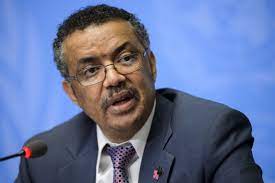APA – Lusaka (Zambia) – The Lifetime Achievement in Public Health Award was given Monday in Lusaka, Zambia to Dr. Tedros Adhanom Ghebreyesus from Ethiopia who is the first African to serve as director general of the World Health Organisation (WHO).
During his tenure with WHO, Dr Tedros worked to accelerate progress against diseases that affected millions of people each year, including HIV/AIDS, malaria, and tuberculosis1. He also played a role in the response to the Ebola virus epidemic, the ongoing COVID-19 pandemic, and the monkeypox outbreak.
Speaking on the sidelines of the annual International Conference on Public Health in Africa (CPHIA) in Lusaka, Dr. Jean Kaseya, Director General, Africa Centers for Disease Control and Prevention (CDC) pointed out that
throughout his tenure at the WHO, Dr. Tedros has exemplified transformative leadership, steering the organization through complex global health challenges with resilience and foresight.
“His commitment to ensuring access to healthcare, promoting equity, and tackling emerging health threats has left an indelible impact on the lives of millions around the world,” he said.
In his remark, the senior Dr Kaseya also commended the WHO boss for being instrumental in the establishment of the Africa CDC.
As the sitting Minister of Health of Ethiopia in 2023, according to him, Dr Tedros was a strong voice for the declaration at the African Union Special Summit on HIV, TB and Malaria (ATM) in Abuja in July 2013 of the need for an Africa Centers for Disease Control and Prevention (Africa CDC).
“His (Dr Tedros) commitment to championing the International Health Regulations and the Pandemic Agreement, which constitute the international legal framework for enhancing pandemic prevention, preparedness, and response, stands as a beacon of inspiration for all of us, a testament to the impact one individual can have on the health and well-being of humanity,” he said.
Apart from the Lifetime Achievement in Public Health Award, CPHIA 2023 is expected to feature nine plenary sessions, 14 parallel sessions, nine abstract-driven sessions, a high-level ministerial session, and opening and closing ceremonies, according to the organisers.
CU/as/APA


